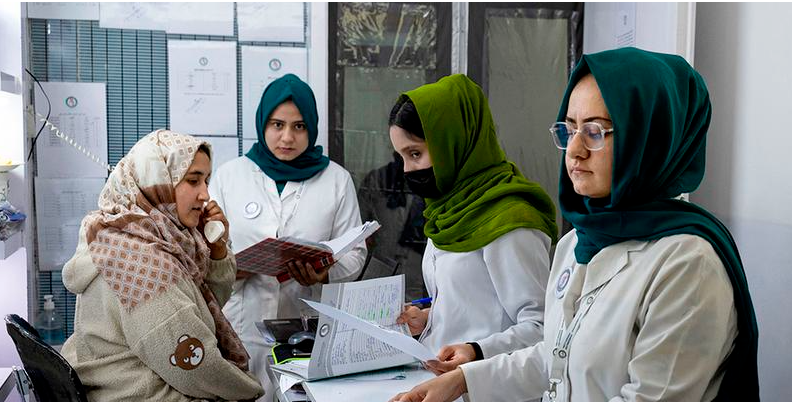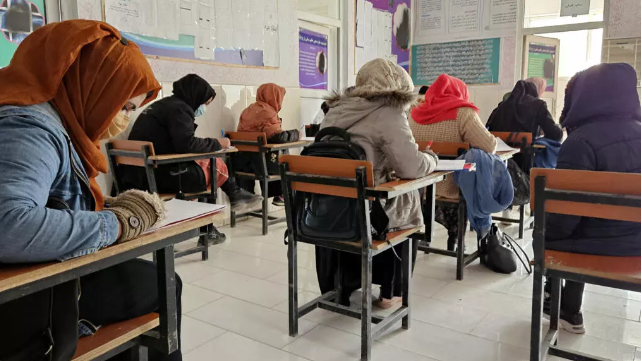1. Introduction: Afghanistan’s Healthcare Crisis Worsens
Taliban Ban Afghanistan’s healthcare system faces yet another daunting challenge as the Taliban’s ban on women’s medical training comes into effect. This decision, part of a series of regressive measures targeting women’s education and employment, threatens to cripple an already fragile health infrastructure. With women constituting a significant portion of Afghanistan’s healthcare workforce, particularly in providing services to women and children, this ban could have devastating long-term implications.
This article examines the impacts of the Taliban’s policy, its repercussions on Afghanistan’s healthcare system, and the calls for international intervention to prevent a complete breakdown.  For the more information click on this link
For the more information click on this link
2. The Role of Women in Afghanistan’s Healthcare System
Women have historically been the backbone of Afghanistan’s healthcare sector, Taliban Ban particularly in addressing the needs of women and children in conservative Afghan society.
- Cultural Context:
In Afghanistan, cultural and religious norms dictate that female patients often refuse to be treated by male doctors. Women doctors, nurses, and midwives are essential for ensuring healthcare access for half of the population. - Workforce Composition:
Prior to the Taliban’s return to power in 2021, women made up a considerable percentage of Afghanistan’s healthcare workforce, especially in midwifery, nursing, and obstetrics. - Training Institutions:
Medical schools and midwifery programs for women played a critical role in training professionals to cater to underserved rural communities.
3. Taliban Restrictions on Women’s Education and Work
Since regaining control in 2021, the Taliban has implemented a series of oppressive measures restricting women’s rights, including:
- Ban on Higher Education:
Female students were barred from universities, including medical schools, in late 2022. - Workplace Restrictions:
Women have been prohibited from working in many sectors, including NGOs and international organizations.
The ban on medical training now extends the crackdown to a vital field, with far-reaching consequences for healthcare delivery.
4. Immediate Impacts on the Health Sector
The prohibition on women’s medical training has caused immediate disruptions in the healthcare sector.
- Staff Shortages:
Hospitals and clinics, especially in rural areas, already suffer from severe staff shortages. The removal of women from medical training programs will exacerbate this crisis. - Decline in Maternal and Child Health Services:
Afghanistan has one of the world’s highest maternal mortality rates. The loss of women health professionals could lead to a significant decline in maternal and child health services, Taliban Ban reversing years of progress. - Restricted Access for Women Patients:
Female patients, reluctant to seek care from male providers, Taliban Ban may forgo treatment altogether, leading to preventable illnesses and deaths.
5. Long-Term Consequences for Public Health
The ban’s long-term effects on Afghanistan’s public health system are dire.
- Loss of Generational Expertise:
With medical training halted for women, the health sector will lose an entire generation of female professionals, creating a gap that will take decades to fill. - Impact on Rural Health:
Rural areas, where healthcare resources are already limited, will be hit hardest. Women in these regions rely almost exclusively on female health providers. - Increased Mortality Rates:
The combination of restricted access and reduced medical workforce will likely cause an increase in mortality rates for preventable and treatable conditions.
6. Humanitarian Organizations Sound the Alarm
International humanitarian organizations have expressed grave concerns over the ban’s impact on Afghanistan’s health sector.
- World Health Organization (WHO):
Warned that the exclusion of women from medical training would deepen Afghanistan’s healthcare crisis. - UNICEF:
Stated that reduced access to maternal and child health services could lead to thousands of preventable deaths. - NGOs:
Many NGOs have highlighted the difficulty of delivering aid under Taliban restrictions, as female staff are essential for operations in conservative areas.
7. Voices from Afghan Women in the Sector
Women working in Afghanistan’s healthcare sector have spoken out against the Taliban Ban despite the risks.
- Female Doctors and Nurses:
Many have reported feeling demoralized, fearing that their careers and efforts to serve their communities are being undone. - Medical Students:
Female medical students who were close to completing their degrees now face an uncertain future, with no clear path to finish their education or work in their profession. - Midwives:
Midwives, a critical component of Afghanistan’s healthcare system Taliban Ban have emphasized that their absence will disproportionately harm women in childbirth.
8. Cultural and Economic Implications
The ban on women’s medical training also carries significant cultural and economic implications.
- Erosion of Social Trust:
Removing women from healthcare will increase distrust between the population and the Taliban government, particularly among women. - Economic Downturn:
Women’s exclusion from education and employment limits their contributions to the economy, worsening Afghanistan’s financial crisis. - Gender Inequity:
This policy cements gender inequity, denying Afghan women the right to education and professional fulfillment.
9. International Reactions and Calls for Action
The global community has widely condemned the Taliban’s restrictions, Taliban Ban with demands for immediate action.
- United Nations:
Called on the Taliban to reverse bans on women’s education and employment, citing violations of human rights and international law. - International Medical Organizations:
Groups like Médecins Sans Frontières (Doctors Without Borders) have urged the Taliban to prioritize public health over political ideology. - Pressure for Sanctions:
Some activists have advocated for targeted sanctions against Taliban Ban leaders to pressure them into reversing these restrictions.
10. What Can Be Done: Possible Solutions
To mitigate the crisis, a multi-faceted approach is required, involving both domestic and international efforts.
- Diplomatic Engagement:
Governments and international organizations must engage with the Taliban Ban to negotiate the restoration of women’s rights in education and healthcare. - Support for Underground Education:
Supporting underground schools and training programs could provide an alternative for women denied formal education. - Regional Collaboration:
Neighboring countries could play a role in offering scholarships and training opportunities for Afghan women in exile. - Humanitarian Aid Conditions:
Donors could link aid packages to specific conditions, such as allowing women to pursue medical training and work.
11. The Broader Picture: Gender Apartheid in Afghanistan
The ban on medical training for women is part of a broader campaign of gender apartheid in Afghanistan.
- Exclusion from Public Life:
Women are now largely excluded from public life, with restrictions on their mobility, Taliban Ban education, and employment. For the more information click on this link
For the more information click on this link - Human Rights Violations:
These policies violate international conventions on human rights and gender equality, Taliban Ban to which Afghanistan was previously a signatory.
12. Conclusion: A Health System in Peril
The Taliban’s ban on women’s medical training is not just a blow to gender equality but a direct threat to the health and well-being of Afghanistan’s population. With millions at risk due to a collapsing healthcare system, Taliban Ban the international community faces a moral and humanitarian imperative to act.
Reversing this policy is not only a matter of protecting women’s rights but also a critical step toward ensuring the survival of Afghanistan’s already fragile health sector. The world must not stand idle as Afghanistan’s women, and its people, bear the brunt of regressive policies. ALSO READ:-White House Unveils National Strategy to Counter Islamophobia: A Comprehensive Plan for Equity and Unity 2024




